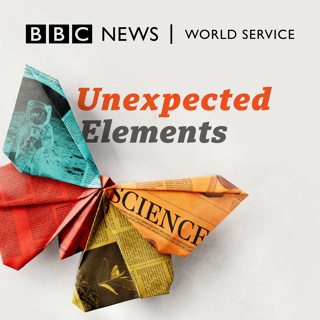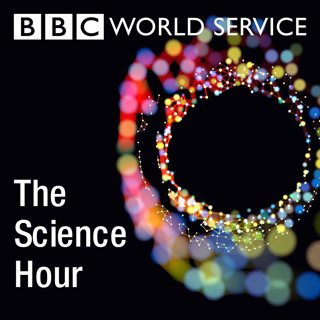
A scientific séance
Join the Unexpected team as they journey beyond the borders of reality to ask why we believe in the illogical. After a fraudulent psychic dupes 1.3 million Americans, panellist Camilla Mota turns to history for insight into how scientists debunk such con artists. The Unexpected library harbours secrets of paranormal experimentation and dead air live on the BBC, and panellist Phillys Mwatee reveals why our beliefs win out over hard evidence written in ink. Nevertheless, in a world rife with conspiracy and vaccine hesitancy, Melissa Kapulu from the KEMRI-Wellcome Trust Research Programme in Kilifi, Kenya, shares the fascinating scientific obstacles faced in the quest to eradicate malaria from Africa once and for all. Also hear how a Nigerian pastor and super-star has been making Melissa's job much harder, and life on fake mars. Presenter: Alex Lathbridge, Phillys Mwatee and Camilla Mota Producer: Harrison Lewis, Alex Mansfield and Noa Dowling
26 Apr 202450min

Computer memories and quantum futures
These days, over a trillion semiconductor microchips are made and shipped each year. The industry is worth eye-watering amounts, and since the 2020-2023 global shortage, nearly all governments are trying to get a slice of the industrial wafer.But what was it like just 40 years ago trying to get yourself a home computer when your communist leaders didn’t approve, and there were nowhere enough devices to go round anyway? Andrada Fiscutean spoke to some of the bootleggers.These days, not only are computing devices in just about everyone’s hands, they are mostly interconnected to vast arrays of machines collectively forming “the cloud”, which provides so much of our economic and scientific infrastructure. It is no longer about stand alone computing. But just maybe the deep future of computing lies in using individual atoms and photons as information-bearing digits. This is the basis of “quantum computing” which could use the properties and mechanics of the quantum scale to perform hugely complicated calculations in fractions of a second. Prof David Lucas of Oxford University physics department and colleagues are building some key demonstrators of the techniques we need to master. And just recently, they built an impressive manifestation of “Blind Quantum Computing”, which just might enable something like the quantum cloud of the future.Also, we have a look at an app for modern motorists that adjusts a piece of music to react to the movement of the car. Developed by Mercedes-AMG and the rapper Will.i.am, Christine Yohannes has been thinking about drivers becoming the musical maestros of their own journeys. Presented by Alex Lathbridge, with Andrada Fiscutean and Christine Yohannes. Produced by Alex Mansfield, with Harrison Lewis and Tom Bonnett.
19 Apr 202449min

Beyoncé, banjos and dancing chemistry
Beyonce's new album tops the charts with a reappraisal of who can do country music and the Unexpected Elements team has a hoedown. Panellist Christine Yohannes unearths new research that changes our understanding of the origins of cowboys. Chhavi Sachdev has a thing or two to teach Beyonce as she reveals why the banjo has it's characteristic twang and we meet a man with powerful chemistry - TikTok dance sensation Dr Andre Isaacs from the College of the Holy Cross in Massachusetts tells presenter Marnie Chesterton how dancing in his lab helps explain click chemistry. We also hear how new species could be given names that refer to the locations they're found in, we discuss whether mining is causing the Earth to shrink and, of course, eclipses make an appearance. We shed some light on how an eclipse over 100 years ago helped prove Einstein's theory of relativity.
12 Apr 202449min

Unexpected elections
In a year when billions of people have been to the ballot box, what do stickleback fish have to do with it? Alex Lathbridge, Tristan Ahtone and Candice Bailey discuss some unexpected elements of electoral studies.Can ancient geology really map election outcomes? What has machine learning done for polling? Psychologist Sandra Obradović drops in to share some of her expertise in the psychology of voting with the team.Plus, what does a solar eclipse have to do with dragons?Presenter: Alex Lathbridge, with Tristan Ahtone and Candice Bailey Producer: Katie Tomsett, with Harrison Lewis, Alex Mansfield and Phil Sansom
5 Apr 202450min

G.O.A.T
Can you put a price on the perfect athlete? In baseball you can, and that’s a $700 million dollar contract. Shoehi Ohtani took to the field in Seoul for the LA Dodgers to prove that the big cheque was worth it. It has Marnie asking – can you predict if one of your kids will become the G.O.A.T – the Greatest of All Time in any sport? She’ll also be investigating the other kind of goat – I'd say ordinary, but these ones are fighting wildfires. We bring you the curious tale of a never-before-seen beach pebble washing up on the shores of a remote island. What are they? And get the lowdown on the most unpleasant sounding ultramarathons after a 40-year-old Scottish woman completes a race SO hard that only 20 people have finished . Plus, gravitational waves, home-grown antivenom, and listening on double speed. Can your brain take it? Presented by Marnie Chesterton, Phillys Mwatee and Camilla Mota.Produced by Harrison Lewis with Tom Bonnett, Jack Lee and Cath Mcghee.
28 Mars 202450min

Ancient water, modern solutions
In a week of headlines about water shortages slowing ships in the Panama Canal and drought in India's Silicon Valley, we look at unexpected ways to manage the world’s water. Presenter Marnie Chesterton and panellists Chhavi Sachdev in Mumbai, India, and Meral Jamal in Nunavut, Canada, tell stories of innovative ideas being tried in their parts of the world. Marnie meets water detective Barbara Sherwood Lollar, professor in earth sciences at the University of Toronto, to hear how ancient water can help us plan for the future. Plus, how submersible speakers can help corals, and stories of living underground. Producer: Dan Welsh with Tom Bonnett, Harrison Lewis, Jack Lee, Katie Tompsett and Emily Preston.
21 Mars 202450min

Fandom: The next generation
Passionate K-Pop fans send us on a journey into the science of fandom. Panellists Andrada Fiskutean in Bucharest, Romania and Tristan Ahtone in Helsinki, Finland bring us stories of Star Trek’s sci-fi utopias, why allegiances affect our behaviour and how a cunning sea creature chooses which side of itself to reveal. Presenter Marnie Chesterton meets one of her heroes - American theoretical cosmologist and particle physicist Dr Chanda Prescod-Weinstein, who helps Marnie understand the universe with lyrical beauty.
14 Mars 202450min

Unexpected Oscars
As award season reaches its climax in the US, Unexpected Elements holds its own glitzy ceremony.Which bit of science will win Best Picture? Who will take home the Best Supporting Actor? And will Prof Elaine Chew play us out with her Best Original Music?The nominations include a particularly noisy tiny fish, a sweating mannequin, and a composition based on a misbehaving heartbeat. All this plus your correspondence and a discussion of how far science infuses the real Academy Awards.Presented by Marnie Chesterton with Godfred Boafo and Camilla Moto.Featuring pianist Elaine Chew, Professor of Engineering at Kings College London.Produced by Alex Mansfield, with Tom Bonnet, Harrison Lewis, Dan Welsh and Katie Tomsett.
7 Mars 202450min





















